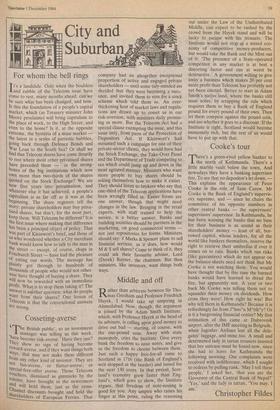Middle and off
ather than arbitrate between Sir Tho- 1\mas Gresham and Professor Friedrich Hayek, I would take up umpiring in Ahmedabad. Now, though, the argument is joined by the Adam Smith Institute, which, with Professor Hayek at the head of its advisers, is calling upon good money to drive out bad — starting, of course, with the one-pound coin. Away with state monopoly, cries the Institute. Give every bank the freedom to issue notes, and give us the freedom to choose between them. Just such a happy free-for-all came to Scotland in 1716 (the Bank of England's writ stopped at the border) and lasted for the next 130 years. In that period, Scot- land's economy grew faster than Eng- land's, which goes to show, the Institute argues, that freedom of note-issuing is good for you. Any umpire who raises his finger at this point, ruling the reasoning out under the Law of the Undistributed Middle, can expect to be rushed by the crowd from the Hayek stand and will be lucky to escape with his trousers. The Institute would not stop at a mixed eco- nomy of competitive money-producers, but would take the Bank and the Mint out of it: 'The presence of a State-operated competitor in any market is at best a distorting factor and can at worst be destructive.' A government willing to give away a business which makes 20 per cent more profit than Telecom has probably not yet been elected. Better to start in Adam Smith's native land, where the banks still issue notes, by scrapping the rule which requires them to buy a Bank of England pound for every pound of their own. Then let them compete against the pound coin, and see whether it goes to a discount. If the Institute is right, Scotland would become immensely rich, but the rest of 'us would have to put up with that.






















































 Previous page
Previous page